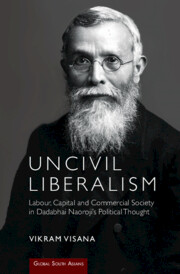Book contents
- Frontmatter
- Dedication
- Contents
- List of Abbreviations
- Acknowledgements
- Introduction
- 1 Sociality in an Imperial and Industrial Age
- 2 Sociality and the Parsis of Western India
- 3 Civil Society and Social Reform
- 4 Conceptualizing the Drain Theory
- 5 Making Commercial Society in India
- 6 Making Commercial Society in Britain
- 7 The Afterlives of Naoroji’s Political Thought
- Conclusion
- References
- Index
4 - Conceptualizing the Drain Theory
Published online by Cambridge University Press: 27 September 2022
- Frontmatter
- Dedication
- Contents
- List of Abbreviations
- Acknowledgements
- Introduction
- 1 Sociality in an Imperial and Industrial Age
- 2 Sociality and the Parsis of Western India
- 3 Civil Society and Social Reform
- 4 Conceptualizing the Drain Theory
- 5 Making Commercial Society in India
- 6 Making Commercial Society in Britain
- 7 The Afterlives of Naoroji’s Political Thought
- Conclusion
- References
- Index
Summary
In the National Archives of India, sequestered within Naoroji's personal papers, is a scrap with the Grand Old Man's scribblings on social issues. On this page, Naoroji announces that ‘every political question is a labour question’. This is followed by a hastily jotted rationale: ‘Heritage of the Earth. Labour of Individual. Guidance of Nature. Our own Body’. Naoroji concluded this stream of consciousness with the ethical injunction that ‘every human being must find nourishment. Present system unfair’. Naoroji's ideas about these natural economic laws were developed in the years following the apotheosis of Parsi philanthropy and social reform in Bombay. This chapter is concerned with the events that caused Naoroji's politics of sociality to shift from social reform and cultural education to economic reform. Two decades of economic crisis and famine in western India during the 1860s and 1870s prompted this step change and culminated in Naoroji's interrogation of British political economy. This culminated in Naoroji's famous ‘drain theory’ of Indian poverty and its materialist account of poverty under capitalist monopoly as the antithesis of commercial society and, therefore, sociality.
Forerunners of the drain or ‘tribute’ paid by India to Britain can be traced back to the early-nineteenth-century religious and social reformer, Rammohun Roy. Dadabhai's senior classmates at Elphinstone, like Bhaskar Tarkhadkar who wrote under the pseudonym of ‘A Hindoo’ in the Bombay Gazette during the 1840s, also spoke of the plundering history of British rule which rendered Indians ‘poorer and poorer’. Most historians have defined Naoroji's variant of the drain theory as the system by which the national resources of India were appropriated via the council bill system, whereby Indian exports were paid for by council bills obtained in London, which were in turn exchanged for rupees at Indian exchange banks to finance production and export. Since these rupees came partly from the Indian land revenue, the indigenous population was, through taxation, financing the extractive mechanism of British firms but receiving none of the profit. The essence of the argument was that the surplus drained away could have been invested in the economic development of India. This excess of outgoing wealth over domestic accumulation and investment was dubbed ‘the Home Charges’.
- Type
- Chapter
- Information
- Uncivil LiberalismLabour, Capital and Commercial Society in Dadabhai Naoroji's Political Thought, pp. 97 - 122Publisher: Cambridge University PressPrint publication year: 2022

